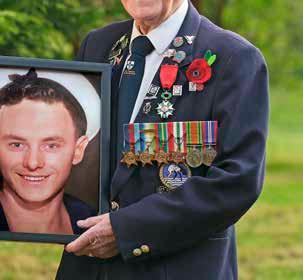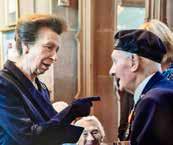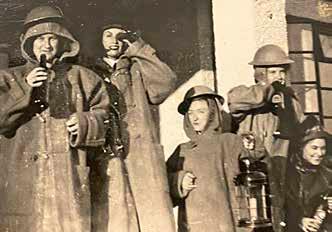HELL EARTH It was on
To mark the 80th anniversary of the Normandy landings, RT talks to four of the last survivors whose courage made D-Day a success – and secured our freedom
INTERVIEWS
BY KATE BATTERSBY
Eighty years after D-Day, it’s the colossal barrage of ammunition fire that Richard Brock remembers. Just a week out of his teens, his very first experience of action was scrambling ashore at Normandy’s Gold Beach as part of the largest seaborne invasion in history.
“The massive noise of battleship gunfire right over our heads targeting the coastal defences was horrendous – like hell on earth,” remembers Brock, of the East Lancashire Regiment’s 1st Battalion. “We were the support troops, so by then the Germans had got organised and we were getting all the heavy stuff from them, too.”
For Brock, it was just the start of a 12-month odyssey as he helped liberate parts of France and the Netherlands, as well as Belsen concentration camp in northern Germany. Covering hundreds of miles, he slept under trees, in hedges and in foxholes, constantly in danger before the Allies were victorious.
Born on the Wirral before moving to Lancaster as an infant, Brock – now on the brink of his 100th birthday – had never been outside northern England when he was called up at 18. He spent almost two years training on Salisbury Plain, the South Downs and Brecon Beacons before going to Kent, where his regiment prepared for D-Day. With the rank of Driver IC (In Charge), he learnt how to waterproof his vehicle and drive in waist-deep water.
“One day in the spring, Monty [General
Bernard Montgomery] came to visit us,” says Brock, of the officer in command of all Allied ground forces during the Normandy invasion.
“He wasn’t aloof, like some. He said, ‘Gather round, lads. There’s a big do coming off. I can’t tell you where, although you’ll find out. But I want you to be prepared.’”
Brock hadn’t any idea of his destination when his ship, the Ocean Vigil, set off down the Thames Estuary with 2,000 men on board. His regiment made landfall in Normandy on D-Day plus two, Thursday 8 June, under heavy fire.
“The advance troops had gone ahead, but Monty held us back in case there was a weakness in the line,” he explains. “We were divebombed, lying on the ground with the earth shaking. You wondered what the hell you were going into. We dug in, taking shelter from air bursts, and gradually advanced.
“I was carrying supplies for others on the front line – rations, ammunition, hand grenades. I drove a Bren Gun Carrier and was always frightened of bazookas. I’d seen what they could do.”
Brock was in HQ Company, which landed on Gold Beach with 130 men. “By the time the hostilities finished a year later, there were 19 of us left. You’d be talking to a chap, and the next minute he’d be dead. Patrols would go out ahead of us, not come back, and then we’d find all of them shot dead. These were men ▷

PHOTOGRAPHED EXCLUSIVELY FOR RADIO TIMES BY MATT SQUIRE
D-Day at80
MAN O’WAR
By the end of the war, Richard Brock had been promoted to sergeant. Far right: his regimental standing orders for postwar Germany
‘You’d be talking to a chap… the next minute he’d be dead’
DRIVER IC, 1ST BATTALION, EAST LANCASHIRE REGIMENT



COURTESY OF RICHARD BROCK
RICHARD BROCK
12 13
D-Day at80
◁ I knew. You’d see terrible things. Death… the stench of carnage. I smelled it twice, in Normandy and at Belsen.”
Brock was among those who entered the concentration camp at Bergen-Belsen on the second day of its Allied liberation in April 1945, by which time 50,000 people were estimated to have been murdered there. It still held 60,000 inmates, living among 13,000 unburied bodies.
“There was a huge sign warning of typhoid,” says Brock. “Dead people were scattered all over. So many injured and
‘What the lads went through must never be forgotten’
RICHARD BROCK
dying, and the rest just skeletons walking around. The smell of death was atrocious.
“As we approached, the poor sods who were barely alive cowered down, as if we were about to whip them. It was pitiful. I asked my co-driver, ‘Where is God, to allow such suffering?’ I was only there for a day or so, but it stays with you. I used to have nightmares, waking up shouting.”
After the war, Brock worked as a butcher and married his childhood sweetheart Pat,
who died last year. As he speaks – he still lives independently in the Lancaster home they shared – he looks at her photograph and his voice wavers at the mention of her. “Having good family – three sons, six grandchildren, two great-grandchildren – keeps me young. They look after me, and I like to potter around.”
One week before the 80th anniversary of D-Day, Brock will reach his centenary, and will be marking it with “a buffet and a natter for 70 people” at Morecambe Golf Club. On 5 June he will meet the Princess Royal and read a poem at the Bayeux War Cemetery commemorations – see page 17 for broadcast details. The next day both he and fellow veteran Ken Benbow (right) will be at the British Normandy Memorial. Within sight of Gold Beach, the Memorial bears the names of the 22,442 service personnel from 30 countries under British command who fell during the Battle of Normandy.


At just 18, Ordinary Seaman Ken Benbow already had more than a year’s service on board HMS Crane when the sloop was transferred to the English Channel to support the Normandy landings. While serving on Crane he had tangled with U-boats in the Battle of the Atlantic and taken part in the invasion of Sicily. Even so, D-Day was on a different level.
“It means everything to be there,” says Brock. “I’m doing it for the pals that fell. There will be a lot of memories, thinking of the smashing mates that didn’t make it. What the lads went through must never be forgotten.
“It doesn’t seem possible that D-Day was 80 years ago. I did what I had to do, and kept my head down. I was just lucky.”

British forces reaching Queen Sector, Sword Beach on 6 June
“There were so many ships, as far as the eye could see, that I couldn’t count them,” he recalls. “At 5.30am on 6 June there was all hell. All round us were destroyers, battleships and cruisers, firing over the top of us. The noise was terrible.”


The armada of 7,000 vessels formed a naval bombardment force, blasting not only inland targets but the beaches themselves, to clear the defences. Benbow worked in Crane’s magazine.
“It was right down in the bottom of the ship, where the shells for our guns were stored. I was sealed into this steel-lined eight-foot square room on my own for 12 hours at a time. I’d receive instruction over the intercom about what shells were needed, and I’d load them into the ammunition hoist. I liked it because I couldn’t hear the shellfire overhead.”
After D-Day, Crane sailed on to join the British Pacific Fleet, and was present in Tokyo Bay in September 1945 during the signing of Japan’s surrender. Benbow, like Richard Brock, holds France’s highest order of merit, the Légion d’Honneur, awarded by the French since 2014 to those who fought to secure France’s liberation.
“I wouldn’t like to see another war,” he says, at the Preston care home where he lives today. “Of course I would fight again if I was able, although of course I’m too old. To younger people, I just say love one another. Be content. We don’t want another war.” KB
PICTURE CREDIT
KEN BENBOW
ORDINARY SEAMAN HMS CRANE
MATT SQUIRE ALAMY; COURTESY OF KEN BENBOW 15
THE WOMEN OF D-DAY
LANDING PARTY
HONOURED With the Princess Royal in 2023; and his HMS Crane badge
For the thousands of people involved in the months of planning for D-Day, secrecy was imperative. Pat Owtram and Christian Lamb were both 18 when they signed the Official Secrets Act upon joining the Women’s Royal Naval Service – the Wrens. Each felt it their duty to be silent about their work not only throughout wartime but for decades afterwards, never speaking of their experiences, even to their closest loved ones.
Early in 1944, Lamb, having previously worked as a plotting officer in Plymouth and Belfast, was assigned to Combined Operations Headquarters in Whitehall, working in a windowless basement office inside Winston Churchill’s secret war rooms.
“My role was to correlate mapped information to create a visual record of the skyline at points along the Normandy beaches, so that the soldiers landing on D-Day could identify where they were,” says Lamb, who’s now 103. “It was very exciting and I was sworn to secrecy. Many staff in the same building were making other preparations, but we never revealed our work to one another. It was ingrained in us not to talk about it, even after the war.”
When she began her role, Lamb was newly married to Lieutenant Commander John Lamb, captain of the destroyer HMS Oribi But even he didn’t know about the nature of her work: “I didn’t tell John until about 50 years later.”
Meanwhile, Owtram served as a Special Duties Y Service Linguist Interceptor, eavesdropping on German naval radio transmissions at coastal listening stations around England. The vital information was passed either to the Admiralty in London or Bletchley Park, the centre of Allied code-breaking during the war.
‘My friend burst into my room saying, “It’s started! It’s started!”
On a spring day in 1944 she unwittingly witnessed part of Operation Fortitude, the vast military deception to mislead German High Command into thinking an Allied invasion was planned at Calais, rather than 200 miles southwest in Normandy.
“In the run-up to D-Day I was stationed at Abbots Cliff House listening station, just outside Folkestone, where the front windows looked straight across the Channel to Calais,” recalls Owtram, who will be 101 in June. “It was getting very lively in the Channel, with a lot of Allied convoys going west under the Kent cliffs, like nothing we’d ever seen before.
“Early one sunny morning I had come off
PAT OWTRAM
WOMEN’S ROYAL NAVAL SERVICE
We served in silence
Pat Owtram and Christian Lamb played vital roles outfoxing the Germans on D-Day – but they never talked about it…

night watch and was sitting outside reading my book when a whole bunch of staff officers came up the path. As they walked within 15 feet of me, I recognised Churchill and Monty. They were unmistakeable. There was a rule that Wrens were not to salute unless we were wearing our hats, but I didn’t have mine with me. So I called, ‘Good morning, everybody!’ They all replied cheerfully including Churchill, who waved.
“He and Monty made great play of going to the top of the cliff and staring out intently at Calais for some time. I thought it rather odd. Of course they wanted to be seen so that word of their visit should reach the Germans. But I told no one for years, because we had been warned there was no release from the Official Secrets Act. If we breached it, the possible penalties included death. My goodness, we took it seriously.”
Owtram’s service with the Wrens was shaped by her formative years. She grew up in Newland Hall, a Lancashire country house belonging to

MILESTONE
“Grandboffin” – her father’s father, a mill owner. Her childhood was one of nannies, tennis parties and ponies, all against a backdrop of the Depression, the abdication of Edward VIII and the rise of Adolf Hitler.
“In 1938, Grandboffin took in two Austrian Jewish refu gees, Edie Krochmalnik and Lilly Getzl, to be cook and housemaid,” says Owtram.

“I would talk with them in the maids’ sitting room, learning to speak German fluently. That facility meant the Wrens were very keen to have me.”
After the war, Owtram’s family expected her to find a husband. But the Wrens had given her a taste of independence, and she would be in her 40s before she married BBC radio news producer Ray Davies.
Pat Owtram (circled) celebrating in 1943 as Italy joined the Allied effort COMMITTED
Lamb (right) began her WRNS training in January 1940
In the interim she used her ex-service grant to fund degrees at St Andrews, Oxford and Harvard universities. After becoming a reporter for the Daily Mail in Manchester, she moved into television. She worked on Florizel (later Coronation) Street, produced University devised Ask the Family and produced Patrick Moore’s coverage of the Moon landings for The Sky at Night including a subsequent promotional tour of the UK by Neil Armstrong.
“When Armstrong came to Manchester, no accommodation had been arranged for him,” says Owtram, “so I mentioned that my family
‘I didn’t tell my husband John until 50 years later’
CHRISTIAN LAMB
would love to have him. He stayed for a couple of nights, and my younger sister Jean saw him play snooker with my father.”
Jean, who died last year aged 97, was herself a cipher officer with the Special Operations Executive in Italy during the war. Yet the sisters’ duty to secrecy meant that it wasn’t until the mid-70s that they revealed their wartime roles to one another, and it was only in 2020 that they wrote a book about it all, Codebreaking Sisters: Our Secret War
D-DAY 80 ON THE BBC
HOW TO SEE AND HEAR ALL THE EVENTS
Dame Helen Mirren hosts D-Day 80: The Allies Prepare from the seafront in Portsmouth where Allied troops departed for the beaches of Normandy. The live commemorative event, presented by Anita Rani with reporter JJ Chalmers, will feature spoken word testimony and performances by musical stars.
WEDNESDAY 5 JUNE 10.15am BBC1




Kirsty Young anchors D-Day 80: Tribute to The Fallen with a live broadcast from Bayeux Cemetery in Normandy and Southsea Common in Portsmouth. As darkness falls, each of the 4,600 headstones at Bayeux will be individually illuminated in tribute. WED 5 JUNE 8.30pm BBC1
CHRISTIAN LAMB
WOMEN’S

D-Day 80: We Will Remember Them will be the first National Commemoration at the British Normandy Memorial to mark the 80th anniversary of D-Day itself. Set overlooking Gold Beach in Ver-sur-Mer, and attended by D-Day veterans, it will conclude with a traditional act of remembrance, accompanied by a special tribute from the Red Arrows. Paddy O’Connell will provide commentary, while Sophie Raworth reports live from the Memorial, joined by special guests.
THURSDAY 6 JUNE 8.30am BBC1
Owtram recalls the morning of 6 June 1944 with pride. “My friend burst into my room saying: ‘It’s started! It’s started!’I feel so proud to have been involved in D-Day. It’s a piece of history I wouldn’t have wanted to miss.”
Christian Lamb left the Wrens soon after D-Day, giving birth to her daughter Felicity that October. She became an expert in botanic gardening, writing two books on the subject – but she was 100 years old before she published an autobiography, Beyond the Sea: a Wren at War, about her service.
“I will always remember hearing on the Home Service that D-Day was under way,” she says.
“I was thrilled to know we had managed to carry out the plans envisaged by so many brilliant brains. A lot of people now know nothing of D-Day, or think that the war isn’t anything to do with them. But everyone should know how important it was. We must always remember D-Day.” KB
Accessible commentary for the live events for the blind and partially sighted will be provided by Petroc Trelawny via iPlayer and the red button.
D-Day: The Unheard Tapes features testimony from the Normandy invasion through audio recordings of British, American, German and French eyewitnesses sourced from archives around the world. Young actors, cast to resemble the interviewees at the time of the war, lip-sync the original testimony. SUN 2—TUE 4 JUNE 9.00pm BBC2
AND DON’T MISS


Special editions of The One Show, Antiques Roadshow Songs of Praise, Bargain Hunt, Countryfile and (on CBBC) Newsround. On 2 June Sunday Worship on Radio 4 is a service of remembrance from Portsmouth Cathedral. On 6 June, Vernon Kay’s and Jeremy Vine’s Radio 2 shows will come from Normandy and Portsmouth, while also on 6 June, Radio 5 Live will have special live coverage and updates from events across the country and in Normandy. On BBC Sounds, D-Day: The Last Voices brings together historical audio recollections; while on iPlayer, you can catch up with BBC2 documentary D-Day: We Were There, presented by Rachel Burden.
NEXT WEEK ON ITV The Royal Albert Hall will host an anniversary event featuring the Royal Philharmonic Concert Orchestra. Hosted by Davina McCall, D-Day 80 at the Royal Albert Hall will bring to a close the national commemorations. SUNDAY 9 JUNE ITV1/ITVX
PICTURE CREDIT COURTESY OF PAT OWTRAM; COURTESY OF CHRISTIAN LAMB ALAMY; SHUTTERSTOCK
ROYAL NAVAL SERVICE
D-Day
16 17 Rad oTimes 1–7 June 2024
at80
PAT OWTRAM
EXCLUSIVELY PHOTOGRAPHED FOR RADIO TIMES BY LIAM JACKSON
Christian



















